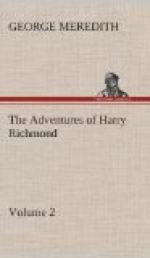’They can, and you come to my mother and my aunt, and see if they can’t tell your fortune,’ said she, in a fury.
‘Yes, and that’s how they fool people,’ said I. I enjoyed seeing the flash of her teeth. But my daring of her to look me in the eyes and swear on her oath she believed the fortunes true ones, sent her into a fit of sullenness.
‘Go along, you nasty little fellow, your shadow isn’t half a yard,’ she said, and I could smile at that; my shadow stretched half across the road. We had a quarrelsome day wherever we went; rarely walking close together till nightfall, when she edged up to my hand, with, ’I say, I’ll keep you warm to-night, I will.’ She hugged me almost too tight, but it was warm and social, and helped to the triumph of a feeling I had that nothing made me regret running away from Rippenger’s school.
An adventure befell us in the night. A farmer’s wife, whom we asked for a drink of water after dark, lent us an old blanket to cover us in a dry ditch on receiving our promise not to rob the orchard. An old beggar came limping by us, and wanted to share our covering. My companion sank right under the blanket to peer at him through one of its holes. He stood enormous above me in the moonlight, like an apparition touching earth and sky.
‘Cold, cold,’ he whined: ’there’s ne’er a worse off but there’s a better off. Young un!’ His words dispersed the fancy that he was something horrible, or else my father in disguise going to throw off his rags, and shine, and say he had found me. ‘Are ye one, or are ye two?’ he asked.
I replied that we were two.
‘Then I’ll come and lie in the middle,’ said he.
‘You can’t; there’s no room,’ I sang out.
‘Lord,’ said he, ‘there’s room for any reckoning o’ empty stomachs in a ditch.’




